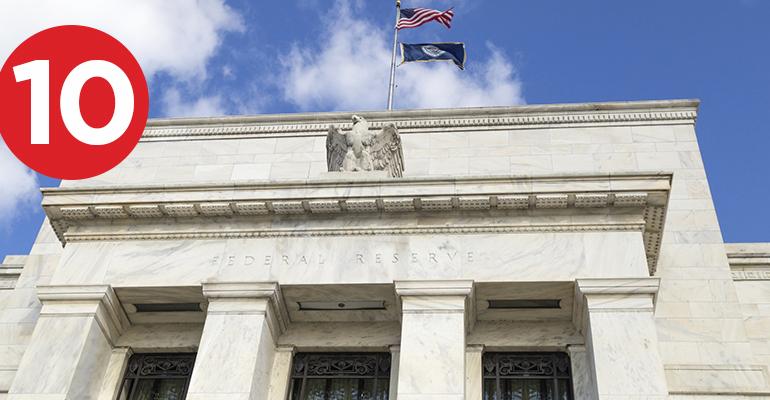- Fed Rate Cut Seen Nearer as Yield Curves Invert “The Federal Reserve’s stunning about-face on rate increases along with weak economic data has left a key part of the U.S. Treasury yield curve close to levels at which the U.S. central bank has in the past been prompted to cut rates. The Fed on Wednesday brought its three-year drive to tighten monetary policy to an abrupt end, abandoning projections for any interest rate hikes this year amid signs of an economic slowdown, and saying it would halt the steady decline of its balance sheet in September.” (Reuters)
- A Recession May Be Coming, But Not for Commercial Real Estate Investors “Financial headlines have been full of worries about a possible recession and a downturn in commercial real estate markets. Recessions often precipitate a decline in real estate markets, but long periods of increasing construction and rising property prices may pose risks of their own. Stock prices fell sharply in December in a bout of turmoil that both reflected these concerns and fed the fears.” (Barron’s, subscription required)
- Effort to Legalize Marijuana in New Jersey Collapses “A monthslong effort to legalize marijuana in New Jersey collapsed on Monday after Democrats were unable to muster enough support for the measure, rejecting a central campaign pledge from Gov. Philip D. Murphy and leaving the future of the legalization movement in doubt. The failure in the legislature marks one of the biggest setbacks for Mr. Murphy, who despite having full Democratic control in the State Senate and the assembly, had faced constant party infighting and had struggled to bend the legislature to his progressive agenda.” (The New York Times)
- Rapid Expansion Pushes WeWork’s Annual Loss to Nearly $2 Billion “WeWork Cos. on Monday said its loss last year doubled to nearly $2 billion, as the nine-year-old company spent heavily in an effort to rapidly expand its network of shared offices around the world. The New York-based company’s revenue more than doubled to $1.82 billion, mostly from leasing office space. But heavy expansion costs led to a loss of $1.93 billion. WeWork executives said the losses are reflective of investments required to build out new offices, and that once locations are open and well-leased, they make far more money than the cost to operate.” (MarketWatch)
- Neiman Marcus, in Debt Talks, Makes It Easier to Bet It Will Fail “Aurelius Capital Management, a distressed-debt hedge fund that made successful bets against Puerto Rico and Argentina, has a new target: the struggling luxury retailer Neiman Marcus. The hedge fund, which is run by bankruptcy lawyer Mark Brodsky, pushed Neiman Marcus Group Ltd. to add language to its bond documents that would make it easier to profit on bets against the retailer, especially if the company defaults or files for bankruptcy, according to people familiar with the matter.” (Wall Street Journal, subscription required)
- Wayfair Is Opening its First Store Ever, the Latest Internet Retailer to Grow Offline “Internet furniture retailer Wayfair is the latest company to go from clicks to bricks. Wayfair on Tuesday announced it will be opening its first full-service store at the Natick Mall in Natick, Massachusetts, which is managed by Brookfield Properties, in early fall of this year. That's after it tested a few pop-up shops, including one at Westfield Garden State Plaza in Paramus, New Jersey, during this past holiday season.” (CNBC)
- New Industrial Park at DFW Airport Has Filled Up “Developers of a 3-building industrial park at DFW International Airport say the business campus is fully leased. Dallas' Stream Realty Partners and Cabot Properties in late 2017 started building the International Logistics Center at the south end of DFW Airport near State Highway 360. The 40-acre campus includes industrial buildings as large as 324,686 square feet.” (Dallas Morning News)
- Real Estate Funds Have a Problem: Too Much Cash “Private real-estate fund managers, sitting on record amounts of cash, are finding it increasingly difficult to spend all that money within the deadlines they promised investors. Funds with fixed lifespans generally promise investors they will spend the money they commit within three to five years. But as of last June, closed-end real-estate vehicles launched in 2013 and 2014 still held $24.8 billion in dry powder, capital committed by investors that has yet to be spent, according to research and data firm Preqin Ltd.” (Wall Street Journal, subscription required)
- Waiting for Mana. What Does the Mogul Who Owns Half of Flagler Street Have Up His Sleeve? “Four years ago, Moishe Mana, the arts mogul and entrepreneur, began acquiring big chunks of downtown Miami’s Flagler Street, raising hopes that the city’s original but bedraggled main drag would finally mount a long-postponed comeback. By the time he was done buying three years later, Mana — already the largest landowner in flourishing Wynwood — had snatched up blocks of shops, commercial spaces and office buildings on or abutting Flagler, some 45 properties in all. The $350 million spree made him the biggest single landlord in the downtown core.” (Miami Herald)
- Seniors at This Retirement Community Are Really into Cannabis-Infused Products “The group of white-haired folks — some pushing walkers, others using canes — arrive right on time at the gates of Laguna Woods Village, an upscale retirement community in the picturesque hills that frame this Southern California suburb a few miles from Disneyland. There they board a bus for a quick trip to a building that, save for the green Red Cross-style sign in the window, resembles a trendy coffee bar. The people, mostly in their 70s and 80s, pass the next several hours enjoying a light lunch, playing a few games of bingo and selecting their next month’s supply of cannabis-infused products.” (MarketWatch)
0 comments
Hide comments

